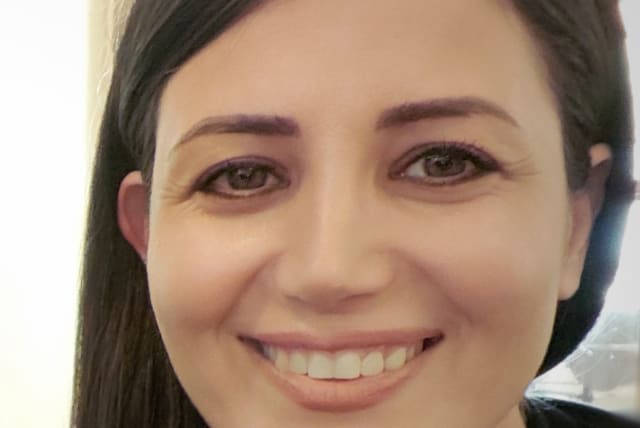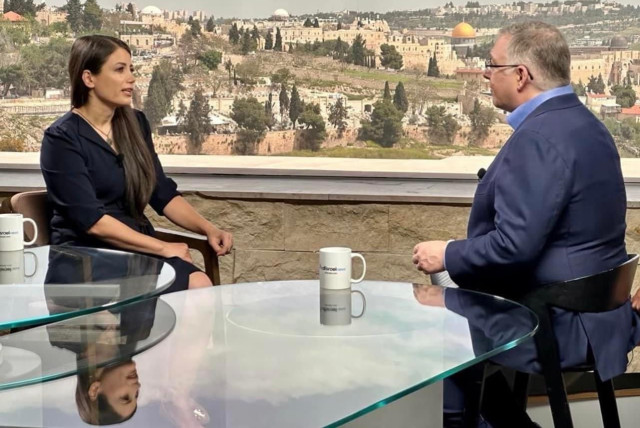An encounter with Marziyeh Amirizadeh: Iranian Christian activist

As a child, Marzi’s pursuit of God began with Islam’s daily Namaz prayers and study of its Quran. Later, she rejected Islam and converted to Christianity.
In early April, an Iranian ex-convict and refugee from the Islamic state visited Israel. Although she came quietly, on her own and as a tourist, her presence was quickly discovered by a number of news organizations. Curiosity created a host of questions. Why was she imprisoned? How did she escape a death sentence? What happened while she was in prison? Why was she released? What does she think about the Iranian regime? Where does she live today? What does she do? What does she think about Jews? About Israel?
And why was she here? Did she have an agenda?
My encounter with her was entirely accidental. On Sunday, April 16, I was in Jerusalem’s Old City. After ordering a sandwich at a cafe, I looked for a table and saw Earl and Kathleen Cox, well-known Christian advocates for Israel. After greeting them, I was invited to join a conversation they were having with a striking dark-haired Persian woman who was telling a remarkable story.
Her name was Marziyeh Amirizadeh. For the sake of Westerners, she goes by the name Marzi.
Born into a nominally Islamic home in Iran, Marzi was the third of four children. Because her father owned several pistachio orchards, he was fairly wealthy. Marzi’s birth, only months before the 1979 overthrow of Iran’s Shah, Mohammad Reza Pahlavi, marked a significant change in her family’s way of life. Their secular environment quickly became one of enforced religion. Islam’s five daily prayers became a legal obligation. Sharia law became the law of the land.
And women became the chattel of men.
Keenly inquisitive, independent, and with an affinity for learning, Marzi excelled as a student. Growing up, she was especially and uniquely drawn to the quest of knowing and being known by God. Perhaps because of a close relationship with her father, she felt that God must be like him. Kind. Encouraging. Ready to help. Her divine “daddy.”
A journey to Christianity
As a child, Marzi’s pursuit of God began with Islam’s daily Namaz prayers and study of its Quran. In spite of, or perhaps because of, Marzi’s desire for a relationship with God, she increasingly found Islam’s Allah to be distant and harsh, nothing like her father. And why, she asked over and over, must she read about him and pray to Allah in a foreign language, Arabic, instead of her native Farsi tongue? Could God not understand Farsi? Dissatisfaction with the Islamic framework for knowing God grew, causing considerable friction with her teachers and, with the exception of her father, at home.
One day, when she was 17, everything changed. It happened because of a dream. In that dream, a white horse appeared. It told her to sit on its back. Once mounted, the horse flew to a mosque, where worshipers dressed in black were coming out from a special ceremony.
“When the horse and I first arrived,” she said, “people couldn’t see us. But suddenly they were changed into animals with wild features, no longer like people at all. Seeing me, they tried to kill me. The horse ran like the wind. As I held fast to the neck of the white horse, I felt its love pouring into me with a power and purity I had never known.”
Although she didn’t know it at the time, the metaphor of a white horse is an infrequent but telling metaphor about the appearance of Messiah as portrayed in the writings of the prophet Zechariah in the Tanach and in the book of Revelation in Christian scripture. Since her first encounter, the White Horse (capitalized in her books) has made numerous appearances in her dreams and visions.
Realizing that such experiences are not normative among mainstream Western cultures, Marzi explained that because access to non-Islamic religious media is virtually nonexistent in Iran, “anyone God wants to reach has to be able to communicate in a way that is safe, private, and secure. Dreams are the perfect solution. God has spoken to Persians in dreams for a very long time. It is [sic] a gift from God to the people he chooses.... God chose [to communicate with me] in a dream because in revolutionary Iran, that is how he could reach me.
“He had a specific plan for his purpose, which was the life-changing dream of the White Horse. I longed to see him and feel his inexpressible, other-worldly love again.”
The experience was a turning point. Marzi completely rejected Islam. A few years later, she heard about the Bible and converted to Christianity, a capital offense in the Islamic Republic of Iran. According to the country’s law, Christianity is a permitted religion. However, converting to it from Islam and proselytizing others to do the same are crimes punishable by death.
Eventually, Marzi accepted an offer to study Christianity in Istanbul, Turkey. While there, she met and became friends with another Iranian, Maryam Rostampour. After completing course work, both returned to Tehran, where the pair began a covert operation of distributing Farsi-language Christian scriptures throughout the city. Systematically covering the metropolitan districts, usually at night, they left approximately 20,000 copies in mailboxes in the very heart of the Islamic Republic.
Three years later, in March 2009, Marzi and Maryam were arrested. Interrogated for hours on end, threatened with the prospect of bloody beatings, the women expected torture. Although not beaten, initial conditions were abysmal.
“Since we had no beds, we slept on the freezing, filthy, bare floor with only urine-soaked blankets for cover. Cells were locked from 8 p.m. until the next morning. If a prisoner had to relieve herself, the only choice was to do so in the cell. The only drinking water came from horrible restrooms with backed-up toilets and toxic waste everywhere, including feces and used sanitary pads. Prisoners were fed like animals from a dirty pot on the floor, without any utensils,” she recounted.
Eventually, they were transferred to Iran’s notorious Evin Prison in northern Tehran. Built in 1972, the facility specializes in the imprisonment of political prisoners. With a population of at least 15,000, many are incarcerated for years waiting for a sentence or release. Execution by hanging is the fate of some.
During what seemed like an endless 259 days, Marzi and Maryam endured ruthless interrogations, along with living conditions that ruined their health. Although never officially sentenced in a court, both were told they had been found guilty of apostasy and were subject to death. Throughout their eight-plus months of imprisonment, the threat of capital punishment was unrelenting. In fact, a number of prisoners they came to know were executed by hanging.
There were, however, offers for release. All they had to do is sign a statement renouncing their faith.
The reality in Iran, Marzi said, is that “many of the religious mullahs who serve as judges know very little about law but a great deal about how to satisfy themselves at the expense of the people who appear before them in court. They expect as a matter of course that men will give them money and that women will give them sex to move their cases along to a favorable conclusion. No money or sex means no action on your case.”
Due to international pressure, the authorities finally relented, releasing the women on November 18, 2009. Both were granted refugee status in the United States, where they became citizens.
During the last 14 years, Marzi and Maryam have earned degrees, written books, and told their stories in countless venues. Together they wrote Captive in Iran: A Remarkable True Story of Hope and Triumph amid the Horror of Tehran’s Brutal Evin Prison, published in 2013. Nine years later, in 2022, Marzi self-published a memoir titled A Love Journey with God: From Pain to Love, Captivity to Freedom, Iran to the US. Both books dive deep into the events at Evin Prison on the one hand, and Marzi’s life story on the other.
One day, several months ago, when “God told me to do so,” Marzi said, she booked a ticket to visit Israel. Coming on her own, her objective was to visit the place where her faith originated.
“I really have had no direct experience with Jews,” she said. “Growing up, they were demonized by the mullahs, portrayed as monsters.”
During her visit, she was the guest in an observant home for Shabbat, an experience she found to be profound. Her host, Jonathan Feldstein, introduced her to several media outlets with which she was interviewed.
Meeting with her only a day before her return to the US, I asked, “What do you think about Israel and Jews now?”
“Both mark the origins of my faith,” she replied. “Israel feels like home.” ■
Brian Schrauger is an American journalist living in Israel.
Jerusalem Post Store
`; document.getElementById("linkPremium").innerHTML = cont; var divWithLink = document.getElementById("premium-link"); if (divWithLink !== null && divWithLink !== 'undefined') { divWithLink.style.border = "solid 1px #cb0f3e"; divWithLink.style.textAlign = "center"; divWithLink.style.marginBottom = "15px"; divWithLink.style.marginTop = "15px"; divWithLink.style.width = "100%"; divWithLink.style.backgroundColor = "#122952"; divWithLink.style.color = "#ffffff"; divWithLink.style.lineHeight = "1.5"; } } (function (v, i) { });

